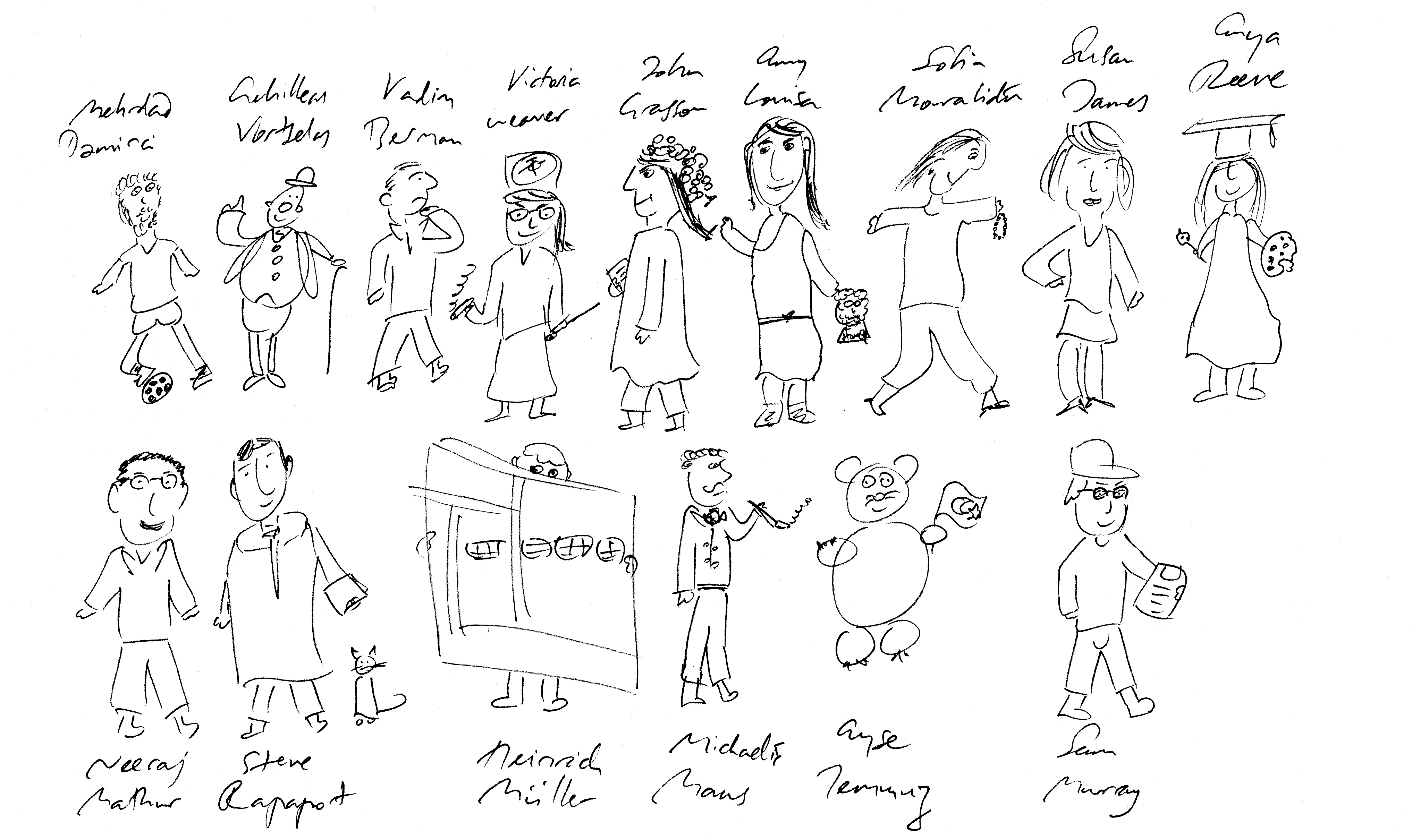
Linguā anglicā: “Key to renowned Quorans”
I have taken to cartooning Quorans I like and banter with. Both the cartoons and the banter feature jocular references that may not be immediately obvious to outsiders, who can only judge from the Quorans’ profile pic. (Often enough, the profile pic is all I have to go on to.)
Herewith, a key to my in-joke references, which gives me a good excuse to link-love Quorans some more. Depictions drawn from profile pics are not further explained.
I love youse guys #4
To Mehrdad Dəmirçi (keep the A2As coming, whether I know the answer or not), Achilleas Vortselas (too level-headed for a Greek, no wonder he was a mod!), Vadim Berman (if only we’d overlapped both on Quora and in Melbourne!), Victoria Weaver (Gustav Mahler says hello, grazhdanka Viktoriya), John Gragson (lay down the law, John), Amy Dakin (whose own Odyssey I’m honoured to follow), Sofia Mouratidis (Yalla tis!), Susan James (the peer review panel looks forward to more research updates), User (Anya of Lincoln, who shall shine even more than her language does), Neeraj Mathur (the learnèd historical linguist), Steve Rapaport (the learning historical linguist), Heinrich Müller (connoisseur of TV Tropes, as any true sociologist must be), Michaelis Maus (the nihilist terror), Ayse Temmuz (must not freak out about Afyonkarahisar, must not freak out about Afyonkarahisar), Sam Murray (confidant(e) in chief),
Mehrdad Dəmirçi: I have no idea if his profile actually shows him playing soccer or not, but I like to think that it does. Mehrdad A2As me a lot, and A2As are a wonderful thing. Especially A2A’s about topics I don’t know about, but I can make intelligent guesses on.
There are lots of A2A’s he asks me that I can’t. But that must not stop him!
Achilleas Vortselas: Achilleas used to be a community moderator here. He is a calm, considered answerer, and we’ve agreed that his experience as a mod helped him reach that level of circumspection.
Vadim Berman: Vadim left Melbourne for Boston, shortly after I joined Quora. Had we overlapped here longer, I’d have been pestering him in person about computational linguistics. I live in hope yet.
Victoria Weaver: As with other Marijuana aficionados, Victoria is holding a tell-tale doobie. I address her as “citizen Victoria” in Russian, because she is a proud Trot (as the felt sickle-and-hammer hat probably does not give away). She’s holding what is meant to be a baton, as a composer.
I allude to Gustav Mahler, because our first encounter was her dissing me about him. I keep baiting her about Mahler; she keeps promising me that when I’m up against the wall when the revolution comes, she’ll pick a lovely bridge for me.
John Gragson: John is a lawyer in the US, but I decided drawing him as a UK barrister would be more fun: Cartoons from my first BNBR by Nick Nicholas on Gallery of Awesomery. He lays down the law here as a Quora critic.
Amy Dakin: Amy (who alas has been Real Name dinged back from Amy Louisa) is a classicist whose specialty is the Odyssey. Hence the tunic. Or at least, that’s meant to be a tunic. What she’s holding is supposed to be a bust of Homer.
Sofia Mouratidis: Sofia is a uni student here in Melbourne town, whose taste in Greek music is somewhat more contemporary than mine, but very, very danceable. Hence the worry beads, obviously. Yalla tis “Allah to her!” is the half-understood exclamation Greeks make when they’re in a dance-y mood.
Susan James: Susan writes about sex, hence the cartoon shortcut of having her had on her hips (already seen with Mary C. Gignilliat). Her bio describes her as a sexual researcher; it stands to reason that if she’s doing the research, we the readers are the peer review panel considering further grant funding.
User: Anya is an artist, writer, and literature scholar, who has just been admitted to Lincoln College, Oxford. Her writing here is infrequent, but glittering.
Neeraj Mathur: Neeraj studied historical linguistics at Oxford, and is a far better Indo-Europeanist than anyone I know.
Steve Rapaport: Steve is studying a PhD in historical linguistics. The photo driving the cartoon is purloined from his Master’s graduation on Facebook. He likes cats.
Heinrich Müller: extremely insightful sociologist, with a soft spot for the treasure trove of cultural studies that is TV Tropes.
Michaelis Maus: contrarian nihilist and self-confessed narcissist, who terrifies me because he may well be right about things. Dresses very well, if he does say so himself—and he does.
Ayse Temmuz: the most popular of several Turkish writers that I follow. Once told me that the best kaymak (clotted cream) to be had in Turkey is in Afyonkarahisar. Afyonkarahisar was the site where the Greek army was routed during the Turkish War of Independence. I imagined myself driving out from Istanbul with Ayse, muttering “must not freak out about Afyonkarahisar, must not freak out about Afyonkarahisar”.
(The drive back wouldn’t be a problem: I’d be on too much of a sugar high to care.)
Sam Murray: Depiction drawn from Sam at Balena with a Clipboard by Nick Nicholas on Gallery of Awesomery. Sam is intersex, and has a packy (prosthetic penis), which they are packing with panache. Sam has been a confidant/confidante [intersex, after all!] over the last many months, for which I am profoundly grateful to them.
